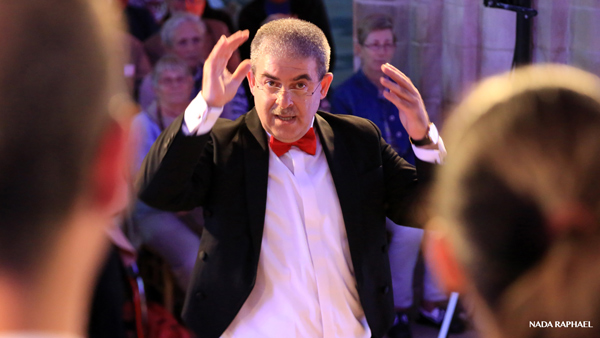In the Middle East countries, the unequaled achievement of the choral art so far was the chorus Gusan headed and founded by choirmaster Komitas in 1910 in Constantinople (over 400 participants). This phenomenon was unique not only as an Armenian cultural achievement. Moreover, it was unique as a manual implemented in the Muslim world, as the group-choral art, especially in participation of women, is in contrast to the Islamic religion. To the point, the founders of the theatric, dance and choral arts were nearly always Armenians. In 2008, for the first time in Yerevan, Gyumri, Stepanakert, and Shushi, the Lebanese Fayha Choir was presented to the Armenian audience, which was founded and headed by our countryman Barkev Taslakian.
During the meeting with “Aravot”, the conductor said that the mentioned choir which consists of 40 singers, is four-part harmonies and has only one Armenian baritone. The team was founded in 2003, in the Lebanon’s second largest city, in Tripoli. Our interlocutor said that since the day of its foundation, the choir belonged to the municipality, and 5-6 years ago, they became independent. Our interlocutor also mentioned that Fayha often travels on guest performances. Just last year, they performed in France, Spain, Holland, Germany, Switzerland, Dubai … The guest performance map of the choir extends from the US to China.
To the observation that such large-scale guest performances also require a “massive” support, Barkev Taslakian replied, “Any problem related to the choir is solved by the former Lebanese Prime Minister, Nazhib Mikati.” To our question that perhaps their sponsor, in addition to national, prefers Armenian music, the choirmaster said that the Arab music dominates in the repertoire, as well as they address the Armenian music, including Komitas, Makar Yekmalyan, Barsegh Kanachyan, and so on, and their three CDs covered also Armenian choir music. During the conversation, Mr. Taslakian noted they still remember the performances of the choir in Armenia and Artsakh. He also added, “The Arab audience does not have the culture to listen to choral music. During the concert, the audience may go in and out, moreover, they do not know how to applaud. They can spontaneously applaud during the singing of the song… Although, I must note that we managed to educate an audience over 13 years.”
We asked him to explain how he manages to present the unique-considered Arab music with the help of the choir, moreover, with four-part harmonies. “You cannot present the Arab music with the academic singing style, you must be able to sound the words clearly. We have letters that you need to “strain” your throat to pronounce them. In short, it is not easy, but we succeeded. The proof of my words are the two awards in the Art World Choral Competition held in Warsaw in 2007, which was attended by around 50 collectives: for the “Best Choir” and the “Best Conductor”.
To the question about his mission in the homeland, and when we will listen to the choir in the homeland, Barkev Taslakian replied, “I cannot be specific about when the choir will arrive in Armenia, but the point that the artists still remembered the Armenian established audience and are looking forward to the guest performances in Armenia, it is a fact. As for my arrival in Armenia, we applied to the directorate of the Armenian State Youth Orchestra, headed by Sergey Smbatyan, with a request to record the hymn of the city of Tripoli. We have already completed our task here, and in Lebanon, we will carry out the combination of the sound. The music is written by composer Ihsan al-Munzir, and the text is written by the poet Sabah Zrek. The music recording was carried out by conductor Ruben Asatryan.” Note that in the first World Festival of Choir Art hosted in Lebanon this spring, Taslakian’s teacher Harutyun Topikyan’s headed “Yerevan” State Chamber Choir of Armenia was among one of around twenty groups arrived from different parts of the world.
Samvel DANIELYAN.
“Aravot” daily
























































